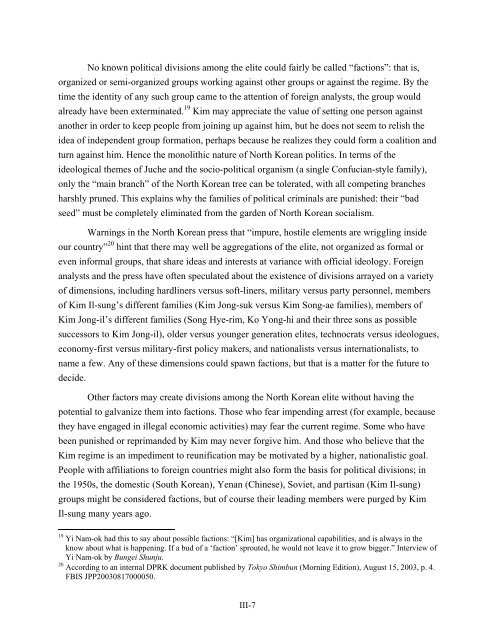North Korean Policy Elites - Defense Technical Information Center
North Korean Policy Elites - Defense Technical Information Center
North Korean Policy Elites - Defense Technical Information Center
You also want an ePaper? Increase the reach of your titles
YUMPU automatically turns print PDFs into web optimized ePapers that Google loves.
No known political divisions among the elite could fairly be called “factions”: that is,<br />
organized or semi-organized groups working against other groups or against the regime. By the<br />
time the identity of any such group came to the attention of foreign analysts, the group would<br />
already have been exterminated. 19 Kim may appreciate the value of setting one person against<br />
another in order to keep people from joining up against him, but he does not seem to relish the<br />
idea of independent group formation, perhaps because he realizes they could form a coalition and<br />
turn against him. Hence the monolithic nature of <strong>North</strong> <strong>Korean</strong> politics. In terms of the<br />
ideological themes of Juche and the socio-political organism (a single Confucian-style family),<br />
only the “main branch” of the <strong>North</strong> <strong>Korean</strong> tree can be tolerated, with all competing branches<br />
harshly pruned. This explains why the families of political criminals are punished: their “bad<br />
seed” must be completely eliminated from the garden of <strong>North</strong> <strong>Korean</strong> socialism.<br />
Warnings in the <strong>North</strong> <strong>Korean</strong> press that “impure, hostile elements are wriggling inside<br />
our country” 20 hint that there may well be aggregations of the elite, not organized as formal or<br />
even informal groups, that share ideas and interests at variance with official ideology. Foreign<br />
analysts and the press have often speculated about the existence of divisions arrayed on a variety<br />
of dimensions, including hardliners versus soft-liners, military versus party personnel, members<br />
of Kim Il-sung’s different families (Kim Jong-suk versus Kim Song-ae families), members of<br />
Kim Jong-il’s different families (Song Hye-rim, Ko Yong-hi and their three sons as possible<br />
successors to Kim Jong-il), older versus younger generation elites, technocrats versus ideologues,<br />
economy-first versus military-first policy makers, and nationalists versus internationalists, to<br />
name a few. Any of these dimensions could spawn factions, but that is a matter for the future to<br />
decide.<br />
Other factors may create divisions among the <strong>North</strong> <strong>Korean</strong> elite without having the<br />
potential to galvanize them into factions. Those who fear impending arrest (for example, because<br />
they have engaged in illegal economic activities) may fear the current regime. Some who have<br />
been punished or reprimanded by Kim may never forgive him. And those who believe that the<br />
Kim regime is an impediment to reunification may be motivated by a higher, nationalistic goal.<br />
People with affiliations to foreign countries might also form the basis for political divisions; in<br />
the 1950s, the domestic (South <strong>Korean</strong>), Yenan (Chinese), Soviet, and partisan (Kim Il-sung)<br />
groups might be considered factions, but of course their leading members were purged by Kim<br />
Il-sung many years ago.<br />
19 Yi Nam-ok had this to say about possible factions: “[Kim] has organizational capabilities, and is always in the<br />
know about what is happening. If a bud of a ‘faction’ sprouted, he would not leave it to grow bigger.” Interview of<br />
Yi Nam-ok by Bungei Shunju.<br />
20 According to an internal DPRK document published by Tokyo Shimbun (Morning Edition), August 15, 2003, p. 4.<br />
FBIS JPP20030817000050.<br />
III-7













